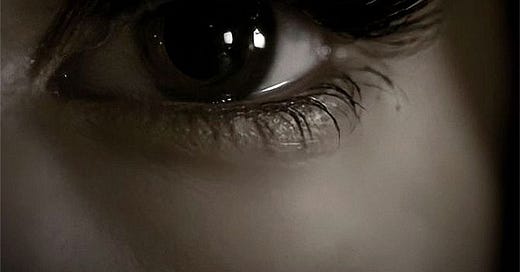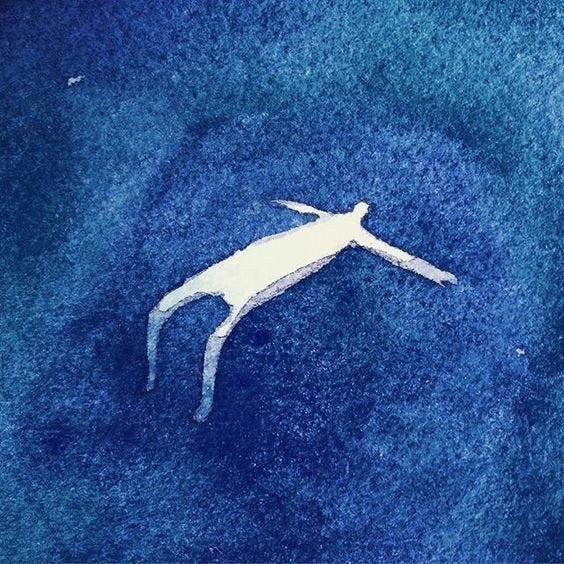There are days when the weight of being human feels unbearable. When every nerve is raw, every emotion an exposed wound, and the sheer act of feeling becomes a punishment. If I could flip a switch—mute the unbearable noise of my own mind—would I? Should I? What would it be like to exist in a state of emotional silence, to walk through the world unburdened by the tides of sorrow and longing? Would it be peace, a serene quiet where my mind no longer battles itself, where every thought is a ripple instead of a storm? Or would it be an empty void, a numbing darkness where I no longer recognized myself, where even the echoes of who I used to be faded into nothingness? Would I be a hollow shell of who I used to be, or would I finally feel light, weightless, untethered from the burdens that hold me down?
I think of Elena Gilbert in The Vampire Diaries, the way she simply turned it all off. Grief, guilt, love, fear—snuffed out like a candle in the wind. Just a decision, a single thought, and suddenly, she was free. Or was she? The absence of feeling, the detachment from consequence, the severing of bonds that had once defined her—it may have relieved her suffering, but it also stripped her of the very essence that made her who she was. Her relationships became mechanical, her interactions devoid of the richness that once gave them meaning. Her freedom was, in many ways, a prison of its own, one where nothing could truly reach her, not even joy. This paradox extends beyond fiction; in real life, emotional detachment may seem like an escape from pain, but it often leads to isolation, disconnection, and a life devoid of the very experiences that give it meaning. The absence of suffering may bring temporary relief, but at the cost of love, connection, and the ability to fully experience the depth of human existence. She became someone else, someone foreign, someone who no longer cared, no longer wept, no longer held onto the things that once made life worthwhile. And that is the paradox of emotional numbness—it seems like an escape, but it is, in truth, a different kind of suffering.
Humanity is a double-edged sword. We exalt it as the thing that makes us special, the bridge between flesh and meaning. It allows us to love deeply, dream infinitely, and create art that cracks open the sky. But with it comes suffering. The kind that digs into the marrow of our bones, that lingers in the quiet hours of the night, that makes even beauty feel like an ache. There is no love without the potential for loss, no passion without the risk of despair. Every attachment is a thread that tethers us to both joy and pain, and sometimes, the balance feels unbearably tilted toward suffering. How do we endure it? How do we justify it? And what does it mean when it feels like too much? I think of the nights when the weight of sorrow is so heavy that even breathing feels like an effort. Like the time I sat in my car, staring at the rain-streaked windshield, wondering if the ache in my chest would ever subside. Or the moment I stood in a crowded room, feeling utterly invisible, trapped in my own loneliness despite the noise around me. These moments press upon us like an unbearable tide, forcing us to question whether feeling so deeply is a gift or a curse. And yet, in that questioning, we find a reflection of what it means to be alive—an acknowledgment of the highs and lows that define our existence.
How many times have we wished to feel less? To shut down, go numb, become untouchable? To shed the skin of sensitivity and wear armor instead? How often have we thought, "If only I didn't care so much"? But what does that truly mean? To live without feeling, to exist without attachment, to drift without the gravity of love and sorrow—what kind of life would that be? Would it be a life at all, or merely survival, a hollow existence where the highs and lows of human experience have been flattened into an endless monotony?
There is a tragic allure to numbness. It promises relief, a temporary ceasefire in the battle between heart and mind. And yet, in the grand scheme of existence, isn’t it the intensity of feeling that makes us alive? The laughter that shakes our ribs, the tears that taste of salt and surrender, the love that threatens to tear us apart—this is the essence of being human. But sometimes, it feels like too much. Sometimes, it feels like an unbearable weight pressing against our chest, making it hard to breathe, hard to move, hard to be. And in those moments, the temptation to switch it all off is overwhelming.
Anne Sexton once wrote, "It is June. I am tired of being brave." Some days, I understand her completely. The bravery of being human, of feeling it all, of absorbing the impact of every moment—how exhausting it is. There is a temptation to press pause, to silence the internal monologue, to simply exist without the weight of emotions clawing at every fiber of our being. But would that be rest, or would it be erasure? The quieting of chaos or the absence of everything that makes life real? If I turned off my humanity, what would I be left with? Would I simply be a breathing body, moving through the world without connection, without meaning?
But if I turned off my humanity, what would I lose? Would I still be me, or just a shadow of myself? Would I still love music the way it seeps into my soul? Would I still care for the people who make my world less lonely? Would I still cry at sunsets, at poetry, at the quiet tenderness of a dog resting its head on my lap? Would I still find solace in art, in stories, in the infinite complexity of the human experience? Or would all of it become meaningless, the vibrancy of the world drained into a lifeless grayscale? And if I cannot feel sadness, can I still feel joy? If I erase grief, do I erase love alongside it?
Or would I become something else entirely? Something cold and distant, unburdened but also unanchored? Because to feel nothing is not to be free; it is to be adrift, severed from the things that make life meaningful. Elena thought she was freeing herself, but she became untethered. No pain, but also no joy. No guilt, but also no love. A hollow victory. A life without suffering is also a life without love, without passion, without the very things that give us purpose. Without the lows, the highs cease to exist. A world without contrast is not a world at all, just a vast and meaningless blur—like a painting without color, a song without melody, a sky forever trapped in twilight, neither day nor night.
There is something sacred about the weight of living. To be human is to be overwhelmed. To feel too much, too deeply, too often. It is to stand at the edge of a storm with no shelter, letting it whip through you, hoping you survive the night. It is to carry the echoes of loss, the ghosts of what once was, the unbearable burden of knowing that everything ends. But it is also to hold love in your hands, to experience wonder, to breathe in moments so exquisite they leave you breathless. The price of joy is pain, but the price of numbness is an emptiness that is far worse.
Perhaps, then, feeling is not a curse, but a testament. Perhaps it is proof that we have lived, that we have loved, that we have risked the pain of existence in exchange for something profound. Maybe the unbearable weight of humanity is not a punishment, but a privilege. Maybe, despite everything, we should be grateful for the ability to feel at all. Because feeling, even when it cuts deep, is the only thing that makes life real. It is the only thing that reminds us we are here, that we are alive, that we are more than just bodies moving through space.
So I sit here, emotions raging like a tempest inside me, and I choose—at least for today—to keep my humanity on. To feel, even when it burns. To love, even when it aches. To exist, even when it hurts. Because to feel is to be alive, and I am not ready to turn that off just yet.
Until next time, with hopes and love, Mukta<3
Hey guys, so one thing, am I yapping too much? Are the newsletters getting too lengthy? Do comment and leave your thoughts.
Xoxo.






